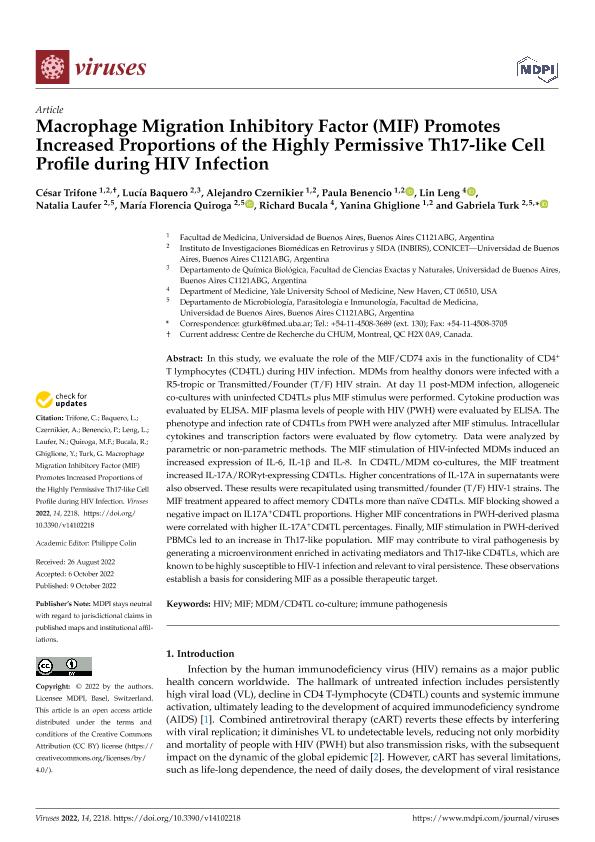Artículo
Macrophage Migration Inhibitory Factor (MIF) Promotes Increased Proportions of the Highly Permissive Th17-like Cell Profile during HIV Infection
Trifone, César Ariel ; Baquero, Lucia
; Baquero, Lucia ; Czernikier, Alejandro
; Czernikier, Alejandro ; Benencio, Paula
; Benencio, Paula ; Leng, Lin; Laufer, Natalia Lorna
; Leng, Lin; Laufer, Natalia Lorna ; Quiroga, María Florencia
; Quiroga, María Florencia ; Bucala, Richard; Ghiglione, Yanina Alexandra
; Bucala, Richard; Ghiglione, Yanina Alexandra ; Turk, Gabriela Julia Ana
; Turk, Gabriela Julia Ana
 ; Baquero, Lucia
; Baquero, Lucia ; Czernikier, Alejandro
; Czernikier, Alejandro ; Benencio, Paula
; Benencio, Paula ; Leng, Lin; Laufer, Natalia Lorna
; Leng, Lin; Laufer, Natalia Lorna ; Quiroga, María Florencia
; Quiroga, María Florencia ; Bucala, Richard; Ghiglione, Yanina Alexandra
; Bucala, Richard; Ghiglione, Yanina Alexandra ; Turk, Gabriela Julia Ana
; Turk, Gabriela Julia Ana
Fecha de publicación:
10/2022
Editorial:
MDPI
Revista:
Viruses
ISSN:
1999-4915
Idioma:
Inglés
Tipo de recurso:
Artículo publicado
Clasificación temática:
Resumen
In this study, we evaluate the role of the MIF/CD74 axis in the functionality of CD4+ T lymphocytes (CD4TL) during HIV infection. MDMs from healthy donors were infected with a R5-tropic or Transmitted/Founder (T/F) HIV strain. At day 11 post-MDM infection, allogeneic co-cultures with uninfected CD4TLs plus MIF stimulus were performed. Cytokine production was evaluated by ELISA. MIF plasma levels of people with HIV (PWH) were evaluated by ELISA. The phenotype and infection rate of CD4TLs from PWH were analyzed after MIF stimulus. Intracellular cytokines and transcription factors were evaluated by flow cytometry. Data were analyzed by parametric or non-parametric methods. The MIF stimulation of HIV-infected MDMs induced an increased expression of IL-6, IL-1β and IL-8. In CD4TL/MDM co-cultures, the MIF treatment increased IL-17A/RORγt-expressing CD4TLs. Higher concentrations of IL-17A in supernatants were also observed. These results were recapitulated using transmitted/founder (T/F) HIV-1 strains. The MIF treatment appeared to affect memory CD4TLs more than naïve CD4TLs. MIF blocking showed a negative impact on IL17A+CD4TL proportions. Higher MIF concentrations in PWH-derived plasma were correlated with higher IL-17A+CD4TL percentages. Finally, MIF stimulation in PWH-derived PBMCs led to an increase in Th17-like population. MIF may contribute to viral pathogenesis by generating a microenvironment enriched in activating mediators and Th17-like CD4TLs, which are known to be highly susceptible to HIV-1 infection and relevant to viral persistence. These observations establish a basis for considering MIF as a possible therapeutic target.
Palabras clave:
HIV
,
IMMUNE PATHOGENESIS
,
MDM/CD4TL CO-CULTURE
,
MIF
Archivos asociados
Licencia
Identificadores
Colecciones
Articulos(INBIRS)
Articulos de INSTITUTO DE INVESTIGACIONES BIOMEDICAS EN RETROVIRUS Y SIDA
Articulos de INSTITUTO DE INVESTIGACIONES BIOMEDICAS EN RETROVIRUS Y SIDA
Citación
Trifone, César Ariel; Baquero, Lucia; Czernikier, Alejandro; Benencio, Paula; Leng, Lin; et al.; Macrophage Migration Inhibitory Factor (MIF) Promotes Increased Proportions of the Highly Permissive Th17-like Cell Profile during HIV Infection; MDPI; Viruses; 14; 10; 10-2022; 1-20
Compartir
Altmétricas



